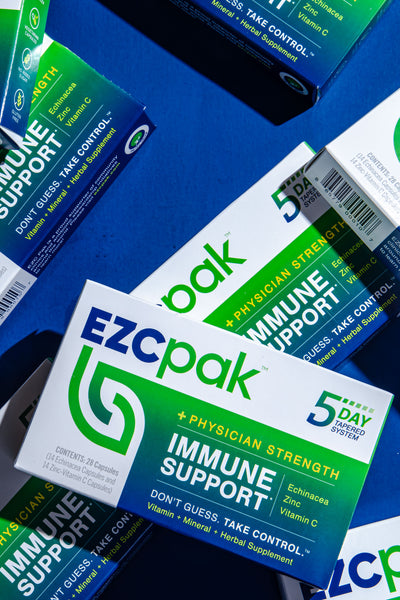Spring has finally sprung. And that means warmer temperatures, longer days, beautiful flowers and...seasonal allergies.
But, it's not always easy to tell the difference between seasonal allergies and the common cold. In this article, we’ll discuss the similarities and differences between these two ailments, and consider some popular remedies, too.
Common Cold
The common cold is a contagious, viral upper respiratory infection (URI) of the nose and throat. According to the Mayo Clinic, children under the age of six catch colds most frequently. Even so, adults might expect to pick up a couple cold viruses a year.
Once you’ve been exposed to the cold virus, you can expect to experience symptoms within 24 to 72 hours. While you won’t always experience every symptom listed, you can expect to suffer from at least of a few of the following:
- Runny nose and sneezing
- Sore, itchy throat
- Very mild body aches
- Very mild headaches
- Congested sinuses
- Coughing
- Occasionally, a very low fever
An important note: yellow or green nasal discharge is common when fighting off the cold virus. This color does not signal a bacterial infection that must be treated with antibiotics. In fact, you cannot treat the common cold -- or any viral infection -- with antibiotics. These powerful medicines treat bacterial infections, and using them inappropriately puts us all at risk of drug-resistant infections.
When suffering from a cold, most patients let the illness run its course. Of course, if symptoms don’t get better over time, or if your fever gets too high, you might want to see your doctor.
While there is no cure for the common cold, supplements rich in echinacea, zinc, and vitamin C, like our EZC Pak, can support your immune system's clearance of the infection.

You can try out these adjunctive therapies as suggested by physicians such as Dr. Aunna Pourang, MD when treating upper respiratory viral infections:
- Adequate fluids
- Enough sleep
- Steam inhalation
- Saline irrigation of the sinuses
- Patience! Colds do pass
Boost your immunity before you catch a cold by eating a wide variety of nutrient-rich foods, getting enough sleep, and washing your hands frequently and properly.
Seasonal Allergies
Unlike the common cold, seasonal allergies are not contagious. They are not caused by a virus; instead, they are caused by an immune response to certain allergens.
According to the American College of Allergy, Asthma, and Immunology, seasonal allergies in the United States begin in February and last through early summer. Unusually warm winter temperatures, extremely rainy springs, or local events such as high winds can also cause allergies.
The ACAAI asserts that ragweed, a very common wild plant, causes the worst of our allergy problems here in the U.S. Other plants that cause us to get sniffly and sneezy include burning bush, sagebrush, and tumbleweed.
How do you know you're suffering from seasonal allergies, and not the common cold?
It can be tough to tell the difference, but there are some discrete symptoms. According to the Mayo Clinic, unlike colds, allergies will rarely cause a sore throat and will almost always cause itchy eyes. And while the common cold will rarely give you a fever, seasonal allergies will never cause one. You should also not experience any muscle aches or pains when suffering from allergies.
There are plenty of medications on the market designed to fight off seasonal allergies, but you can try to alleviate these symptoms more naturally with vitamin C-rich supplements instead.
You can also do your best to prevent seasonal allergies with the following tips from the ACAAI:
- Keep an eye on pollen and mold counts on a reliable weather website’s allergy forecast
- Close windows and doors when pollen counts are high
- Shower, wash hair, and change clothes after spending time outdoors when exposed to allergens
- Wear a nose and mouth mask when mowing the lawn

For extremely dry nights, we recommend a humidifier.
Whether Cold or Allergies, Take Care of Yourself
Nobody likes to feel sick, and seasonal allergies, though not contagious, can be a real pain. Just because you aren’t technically ill, doesn’t mean you don’t need a sick day to rest up and feel better. Understanding the differences between a cold and allergies will help you understand whether you're contagious, and what prevention tips you should consider so that you can avoid symptoms altogether next time.






